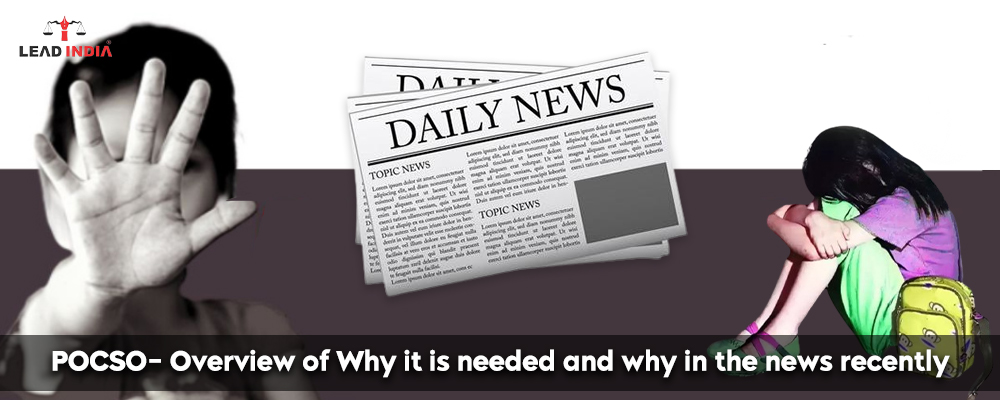The Protection of Children from Sexual Offences Act (POCSO) of 2012 is the most effective and balanced weapon for addressing these crimes against children who have experienced various forms of sexual abuse. The act is both a panacea in terms of giving instruments and a scourge in terms of defects and regressiveness.
Even though the act has many shortcomings in its execution, it has been characterised with genuine efforts to erase the past and scars of children sexually assaulted in a variety of ways. Sexually abused children who are marginalized must rely on their elders, and in addition to sexual abuse, they are denied basic economic rights such as food, clothes, and shelter.
Need A Legal Advice
The internet is not a lawyer and neither are you. Talk to a real lawyer about your legal issue

The Need for POCSO Act
Before the implementation of the POCSO Act, 2012, the only legislation in India targeted at preserving a child’s rights was the Goa’s Children’s Act, 2003 and Rules, 2004. Child sexual abuse is punishable under Sections 375, 354, and 377 of the Indian Penal Code, 1860. These provisions do not protect masculine youngsters against sexual abuse or modesty. Furthermore, the Code does not define phrases such as ‘modesty’ and ‘unnatural offense’.
Moreover, Child sexual abuse is on the rise all over the world, particularly in our nation, India, which ranks among the top five countries in terms of the number of sexual offenses against minors. In many ways, Indian criminal law appears insufficient to address such a sensitive topic.
Thus, POCSO, 2012, was enacted to make it simpler for victims of sexual assault to seek justice. The Act requires more compassionate means of dealing with victims and forbids judicial victimization of minors. As a result of increasing awareness, the number of such reports has more than doubled.
Overview of the Act
- The Act is gender-neutral, with a focus on the child’s best interests and welfare at all stages to guarantee healthy physical, emotional, intellectual, and social development.
- The Act defines a child as any individual under the age of 18 and considers the child’s best interests and well-being to be of paramount priority at all times, to ensure the kid’s healthy physical, emotional, intellectual, and human growth.
- It defines various types of sexual abuse, including penetrative and non-penetrative assault, sexual harassment, and pornography, and considers a sexual assault to be aggravated in certain circumstances, such as when the abused child is mentally ill or when someone in a position of trust or authority commits the abuse over the child, such as a family member.
- People who engage in child trafficking for sexual purposes are likewise penalized under the Act’s abetment provisions.
Why the POCSO Act was in the news recently
The POCSO Act was recently in the news due to its amendment. The Minister of Women and Child Development, Ms. Smriti Zubin Irani, introduced the Protection of Children from Sexual Offences (Amendment) Bill, 2019, in the Rajya Sabha on July 18, 2019. The bill changes the 2012 Protection of Children from Sexual Offences Act.
- Penetrative sexual assault is punishable by imprisonment for seven years to life, as well as a fine. The bill raises the minimum sentence from seven to ten years. It further states that if a person performs penetrative sexual assault on a kid under the age of 16, he will face imprisonment for 20 years to life, as well as a fine.
- The Bill expands the definition of aggravated penetrative sexual assault to include two additional reasons. These include (i) assault that results in the death of a child, and (ii) assault committed during a natural disaster or other violent situation. Currently, the penalty for aggravated penetrative sexual assault is imprisonment for 10 years to life plus a fine. The Bill raises the minimum sentence from ten to twenty years and the maximum penalty to death.
- The Bill includes two new offenses under the scope of aggravated sexual assault. These include (i) assault during a natural disaster; and (ii) providing or assisting in the administration of any hormone or chemical substance to a kid to achieve early sexual maturity.
- The Bill defines child pornography as any visual depiction of sexually explicit behavior involving a child, including photographs, video, digital, or computer-generated images that are indistinguishable from an actual kid.
Lead India offers various legal services, such as free legal advice and internet information. We provide a facility in which you can talk to a lawyer and ask legal questions regarding the law here. Lead India’s lawyers can assist you with any legal issues. In India, Lead India provides free legal assistance online. In addition to receiving free legal advice online, Lead India allows users to pose inquiries to experts for free.





 Talk to a Lawyer
Talk to a Lawyer